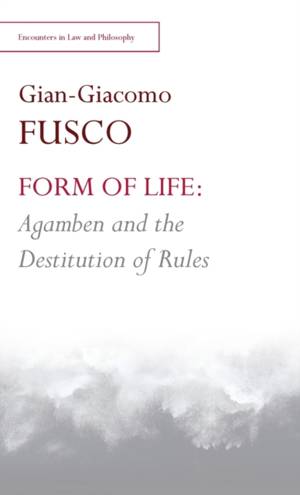
Je cadeautjes zeker op tijd in huis hebben voor de feestdagen? Kom langs in onze winkels en vind het perfecte geschenk!
- Afhalen na 1 uur in een winkel met voorraad
- Gratis thuislevering in België vanaf € 30
- Ruim aanbod met 7 miljoen producten
Je cadeautjes zeker op tijd in huis hebben voor de feestdagen? Kom langs in onze winkels en vind het perfecte geschenk!
- Afhalen na 1 uur in een winkel met voorraad
- Gratis thuislevering in België vanaf € 30
- Ruim aanbod met 7 miljoen producten
Zoeken
Omschrijving
The concept of a form-of-life is the centre of gravity around which Agamben has advanced his attempts to think of an alternative politics. It refers to a living dimension that has overthrown the structures of power in which humans are supposedly destined to live, disclosing the possibility of a new understanding of political and legal life. By placing 'form-of-life' in the context of contemporary philosophy, this book re-imagines anew some of the basic categories of human socialities - such as work, rights, obligation, property, and use. It explores the ways in which Agamben's philosophy might be a strategic resource for developing political and legal strategies that leave behind a situation dominated by pervasive sovereign violence.At a moment of history in which the fundamental promises of Western modernity are undergoing a decisive crisis, to look beyond the basic categories of human social institutions becomes an urgency. Through a close engagement with Agamben's concept of form-of-life, this book seeks to challenge the current crisis of juridical, political and economic reality.
Specificaties
Betrokkenen
- Auteur(s):
- Uitgeverij:
Inhoud
- Aantal bladzijden:
- 232
- Taal:
- Engels
- Reeks:
Eigenschappen
- Productcode (EAN):
- 9781474460927
- Verschijningsdatum:
- 13/12/2022
- Uitvoering:
- Hardcover
- Formaat:
- Genaaid
- Afmetingen:
- 140 mm x 216 mm
- Gewicht:
- 417 g

Alleen bij Standaard Boekhandel
+ 305 punten op je klantenkaart van Standaard Boekhandel
Beoordelingen
We publiceren alleen reviews die voldoen aan de voorwaarden voor reviews. Bekijk onze voorwaarden voor reviews.









